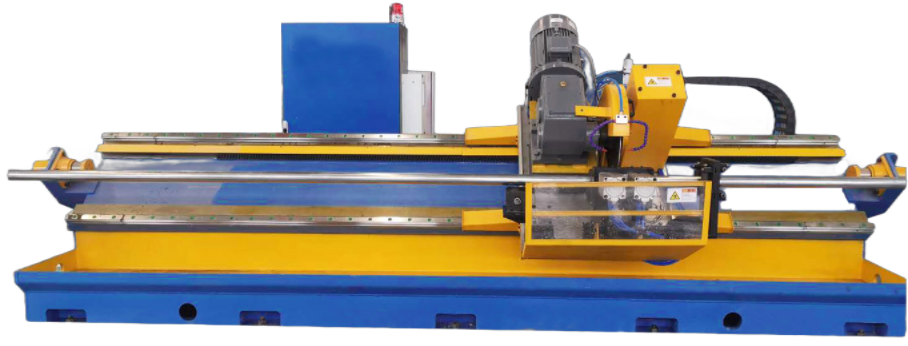Roof Panel Crimping Machine for Efficient Sheet Metal Forming and Installation
The Roof Sheet Crimping Machine An Essential Tool for Modern Construction
In the contemporary landscape of construction and manufacturing, efficiency and precision are key to ensuring high-quality outcomes. One of the essential tools that have emerged to meet these needs is the roof sheet crimping machine. This specialized equipment plays a critical role in the production of roofing sheets, which are fundamental to a variety of structures, from residential homes to industrial warehouses.
What is a Roof Sheet Crimping Machine?
A roof sheet crimping machine is designed to create interlocking profiles on metal sheets, enabling them to fit together seamlessly. This machine typically uses a series of rollers to bend and form the metal sheets into the desired shape and size, ensuring they can be easily installed and interlocked. The crimping process not only enhances the structural integrity of the sheets but also helps in managing water runoff, making them ideal for use in various climatic conditions.
The Importance of Crimping in Roofing
Crimping roofing sheets adds several significant benefits
1. Water Resistance The interlocking design created by crimping ensures that water does not seep through joints. This is particularly vital in regions prone to heavy rains, where water tightness is paramount.
2. Aesthetic Appeal Crimped roofing sheets offer a sleek and modern appearance. The uniform pattern enhances the visual appeal of structures, making them more attractive to potential buyers or occupants.
3. Durability and Longevity Metal roofing sheets, when crimped, are less prone to warping or bending under stress. This enhances their lifespan, reducing the need for frequent replacements and repairs.
4. Efficient Installation The crimping process allows for quick and easy installation of roofing sheets. Construction teams can save valuable time and labor costs, leading to more efficient project completion.
Types of Roof Sheet Crimping Machines
Various types of roof sheet crimping machines exist to cater to different production needs. The machines can be categorized based on their operational mechanisms, such as manual, semi-automatic, and fully automatic options.
roof sheet crimping machine

- Manual Crimping Machines While labor-intensive, these machines are often more affordable and suitable for small-scale operations. They require skilled workers to operate, making them ideal for custom or low-volume projects.
- Semi-Automatic Machines These machines strike a balance between efficiency and cost. They require some degree of manual intervention but automate significant portions of the crimping process.
- Fully Automatic Machines For large-scale manufacturing, fully automatic roof sheet crimping machines are the best option. These machines can handle high volumes of material, operate with minimal human oversight, and ensure consistent quality and precision.
Factors to Consider When Choosing a Crimping Machine
When selecting a roof sheet crimping machine, several key factors must be taken into account
1. Production Volume Understand the volume of roofing sheets required for projects to determine the appropriate machine type—manual, semi-automatic, or fully automatic.
2. Material Compatibility Ensure the machine can handle the specific types of metal being used, whether it be galvanized steel, aluminum, or other materials.
3. Technological Features Look for machines with advanced features such as programmable settings, automated adjustments, and safety features to enhance usability and safety.
4. Maintenance and Support Opt for manufacturers that provide comprehensive support services, including maintenance manuals and readily available spare parts.
Conclusion
The roof sheet crimping machine is an indispensable asset in the modern construction toolkit. By facilitating the effective production of durable, aesthetically pleasing, and water-resistant roofing materials, these machines enhance project outcomes and contribute to the longevity of structures. As construction demands evolve, investing in the right crimping technology will remain crucial for builders and manufacturers striving to stay ahead in a competitive industry.
-
High Frequency Straight Seam Welded Pipe Production Line-BzZhou Xinghua Machinery Equipment Manufacturing Co., LTD.|Precision Welding, High EfficiencyNewsJul.30,2025
-
High Frequency Straight Seam Welded Pipe Production Line|BzZhou Xinghua|Precision Welding&EfficiencyNewsJul.30,2025
-
High Frequency Straight Seam Welded Pipe Production Line - BzZhou Xinghua|Precision Engineering&EfficiencyNewsJul.30,2025
-
High-Frequency Straight Seam Welded Pipe Production Line-BzZhou Xinghua Machinery Equipment Manufacturing Co., LTD.NewsJul.30,2025
-
High-Frequency Straight Seam Welded Pipe Production Line-BzZhou Xinghua Machinery Equipment Manufacturing Co., LTD.|Precision Manufacturing, High EfficiencyNewsJul.30,2025
-
High Frequency Straight Seam Welded Pipe Production Line-BzZhou Xinghua Machinery Equipment Manufacturing Co., LTD.|Precision Steel Pipe Manufacturing&Industrial EfficiencyNewsJul.29,2025


